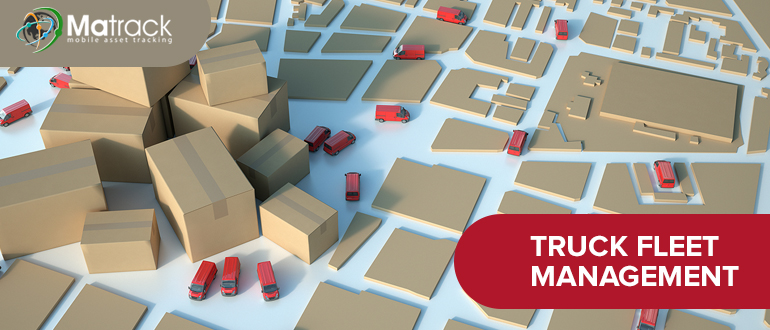Key Takeaways
- Truck fleet management ensures cost savings, efficiency, and compliance in trucking operations.
- It includes tracking trucks, managing fuel, scheduling maintenance, and monitoring driver performance.
- Using GPS tracking, route optimization, and preventive maintenance helps reduce downtime and costs.
- Matrack provides fleet tracking, dash cams, and ELD solutions to simplify and improve fleet management.
What Is Truck Fleet Management?
Truck fleet management is about keeping a fleet of trucks running efficiently. It involves tracking locations, managing fuel, scheduling maintenance, monitoring drivers, and ensuring compliance with regulations.
The focus is on reducing downtime, cutting costs, improving safety, and keeping trucks in top condition for reliable operations.
Why Is Truck Fleet Management Important?
Truck fleet management keeps operations efficient, cuts costs, improves safety, and ensures compliance. Without it, businesses face high fuel expenses, frequent breakdowns, late deliveries, and regulatory issues.
Cuts Costs
Tracking fuel use and scheduling maintenance helps reduce fuel waste, prevent costly repairs, and extend truck life.
Improves Safety & Compliance
Regular maintenance and driver monitoring reduce accidents. Following transport laws, like Hours of Service (HOS), prevents fines and legal trouble.
Boosts Productivity
Route planning and real-time tracking reduce delays, helping drivers complete trips faster and more efficiently.
Prevents Breakdowns
Routine maintenance stops unexpected failures, keeping trucks on the road and avoiding delivery delays.
Ensures On-Time Deliveries
Efficient scheduling and tracking improve delivery times, keeping customers satisfied and business running smoothly.
Key Components of Truck Fleet Management
Truck fleet management involves multiple processes to keep operations efficient, reduce costs, and ensure safety. Each component plays a critical role in maintaining a well-functioning fleet.
Vehicle Tracking
GPS and telematics systems monitor truck locations in real-time. This helps with route optimization, reduces idle time, and improves delivery accuracy.
Fuel Management
Tracking fuel consumption helps reduce waste and control expenses. Monitoring driver habits like excessive idling or harsh acceleration improves fuel efficiency.
Maintenance Scheduling
Regular inspections and preventive maintenance prevent costly breakdowns. Scheduled servicing extends truck lifespan and ensures compliance with safety regulations.
Driver Management
Monitoring driver behavior, training programs, and safety measures help reduce accidents and improve performance. Good driver management lowers insurance costs and increases productivity.
Compliance & Regulations
Ensuring trucks and drivers meet legal requirements, such as Hours of Service (HOS) rules, emissions standards, and licensing regulations, prevents fines and legal issues.
Route Optimization
Using data-driven tools to find the best routes reduces fuel costs, minimizes delays, and improves delivery efficiency. Advanced software factors in traffic, weather, and road conditions.
Cost Control
Managing fuel, maintenance, insurance, and operational expenses helps maximize profitability. Data analytics provide insights into cost-saving opportunities.
Best Practices for Efficient Truck Fleet Management
Efficient truck fleet management ensures lower costs, better performance, and fewer delays. These practices help keep trucks in top condition while improving overall operations.
Track Trucks in Real Time
Using GPS tracking helps monitor truck locations, avoid traffic congestion, and improve delivery schedules. Real-time tracking also enhances security by preventing unauthorized use.
Schedule Regular Maintenance
Routine truck servicing prevents unexpected breakdowns. Checking engine performance, tire conditions, and brake systems reduces repair costs and keeps trucks roadworthy. Know more about: Fleet Vehicle Maintenance.
Monitor Driver Performance
Tracking speed, braking, and idle time helps improve driving habits. Safe driving reduces fuel waste, prevents wear on truck components, and lowers accident risks.
Plan Efficient Routes
Route optimization tools help reduce fuel consumption and delivery time. Factoring in road conditions, weather, and weight restrictions ensures smoother trips.
Control Fuel Usage
Tracking fuel consumption helps identify waste and prevent excessive idling. Fuel cards and monitoring systems help control refueling expenses.
Ensure Compliance with Trucking Regulations
Following Hours of Service (HOS) rules and using Electronic Logging Devices (ELDs) help avoid legal issues. Proper documentation ensures trucks operate within industry standards.
Use Fleet Management Software
Digital systems help track truck performance, schedule maintenance, and generate reports. Automating these tasks improves efficiency and reduces paperwork.
Protect Trucks from Theft
Using geofencing, anti-theft locks, and remote engine disabling helps prevent cargo theft. Securing parking locations also reduces security risks.
Reduce Truck Downtime
Predictive maintenance tools detect potential issues before they cause breakdowns. Regular inspections help keep trucks on the road and minimize delays.
Improve Communication with Drivers
Using mobile apps and direct communication channels ensures quick updates on routes, weather changes, or delivery adjustments. Clear communication helps prevent delays and misunderstandings.
How Matrack Helps With Truck Fleet Management
GPS Fleet Tracking Solutions
Matrack’s GPS fleet tracking helps businesses keep an eye on their trucks at all times. It sends alerts for ignition status, speeding, and unauthorized movements, improving security and efficiency.
With real-time tracking and custom reports, managers can monitor fuel use, truck health, and driver behavior. The system works on mobile and desktop, making it easy to manage the fleet from anywhere.
Fleet Dash Cam
Matrack’s fleet dash cam records video to improve safety and prevent accidents. It detects risky driving, like texting or drowsiness, and alerts drivers instantly.
The system supports up to five cameras, giving a full view of the truck and surroundings. It also provides lane departure and collision warnings, helping drivers stay alert and safe.
ELD Compliance Solution
Matrack’s ELD automatically tracks Hours of Service (HOS) to help drivers stay compliant with regulations. The device is easy to install and keeps accurate logs to prevent violations.
It also offers IFTA reporting and compliance monitoring to reduce paperwork. With reliable uptime and live customer support, trucking companies can manage records without hassle.
Fleet Fuel Card
Matrack Fleet Fuel Card helps trucking companies save money on fuel. It finds the cheapest gas stations and is accepted at 95% of U.S. fuel stations.
Managers can track fuel spending in real time and set limits to control costs. The card also simplifies IFTA reporting, making tax filing faster and easier.
Freight Factoring Services
Matrack’s freight factoring service ensures trucking companies get paid on time. There are no credit checks for corporations, and businesses receive same-day payments.
With low factoring fees, trucking companies can keep cash flow steady. Those who sign up also get free telematics tools like GPS tracking and ELD services.
Conclusion
Truck fleet management helps businesses save money, reduce downtime, and keep trucks running safely. Proper tracking, maintenance, and route planning make operations smoother and more efficient.
Matrack offers simple tools like GPS tracking, dash cams, and fuel management to help trucking companies stay on track. These solutions improve safety, cut costs, and make fleet management easier for any business.


